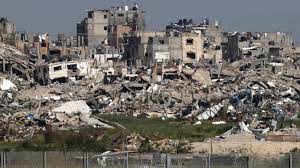Israel says it is not blocking aid from going into Gaza and such an allegation is “wholly unfounded.”
The UN’s top court has ordered Israel to enable the unhindered flow of aid into Gaza in order to avert a famine.
In a unanimous decision, the International Court of Justice (ICJ) said Israel must act “without delay” to allow the “provision… of urgently needed basic services and humanitarian assistance”.
This follows warnings that famine could hit Gaza within weeks.
Israel has called allegations it is blocking aid “wholly unfounded”.
Giving its response to the court order, the Israeli foreign ministry said it was continuing “to promote new initiatives, and to expand existing ones” to allow a continuous flow of aid into Gaza “by land, air and sea”, working with the UN and others.
It said that Hamas was to blame for the situation in Gaza and for starting the war.
The latest ruling by the court in The Hague comes after South Africa asked it to bolster an order issued to Israel in January to take all measures to prevent genocidal acts in Gaza.
Although orders issued by the ICJ are legally binding, the court lacks the power to enforce them. The UN Security Council is the only UN body which can introduce measures to try and ensure compliance.
The ICJ’s ruling comes after a report by the Integrated Food Security Phase Classification Global Initiative, which is run by the World Food Programme and others, was published last week – warning that a “catastrophic” situation was developing in Gaza.
It said that all of the 2.2 million people in Gaza were “facing high levels of acute food insecurity” and that famine was projected to hit the north of the territory before the end of May.
Famine occurs when a country has such a severe food shortage that its population faces acute undernourishment, starvation, or death.
In its ruling, the ICJ said Gaza was “no longer facing only a risk of famine” but “famine is setting in” and that, according to UN observers, 31 people, including 27 children, had already died of malnutrition and dehydration.
The court also noted comments by Volker Türk, the UN’s high commissioner for human rights, who said last week that the “situation of hunger, starvation and famine” was “a result of Israel’s extensive restrictions on the entry and distribution of humanitarian aid and commercial goods, displacement of most of the population, as well as the destruction of crucial civilian infrastructure”.
Mr Türk recently told the BBC that there was a “plausible” case that Israel was using starvation as a weapon of war in Gaza and that, if intent was proven, this would amount to a war crime.
The ICJ said Israel must “take all necessary and effective measures to ensure, without delay, in full co-operation with the United Nations, the unhindered provision at scale… of urgently needed basic services and humanitarian assistance”.
The aid most needed included food, water, electricity, fuel, shelter, and clothing as well as hygiene products and medical supplies, it said.
Recent months have seen long queues of aid trucks repeatedly forming as they wait to enter Gaza from Egypt, and accusations levelled at Israel that it is subjecting the deliveries to complex and arbitrary checks.
Israel has further said that Hamas takes much of the aid that enters Gaza and accused the UN of failing to distribute what is left to the civilian population.




































Very informative article! I appreciate the depth of analysis. If you want to delve deeper, here’s a helpful resource: EXPLORE FURTHER. Eager to hear everyone’s thoughts!